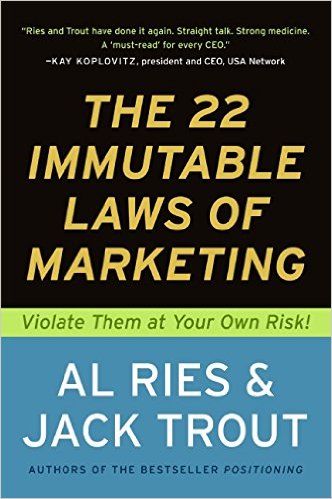This book packs so much useful information about marketing, if you read one book about marketing let it be this one.
Marketing is about perception not about superiority. If you want to sell your product you have to tweak your appearance and product in a way which makes it seem superior to those of the competition.
Once people perceive your product as different, as superior, unique, or whatever makes it stand out, people will buy it.
Get your brand in people’s minds
In the US when people mean photocopier they often say “Xerox,” similarly people ask for a “Kleenex” when they need a tissue, why is this? Because the brands of those companies are etched into the minds of people.
You need to come up with a brand-name which will stick. Which brand would you rather choose for a computer company, Apple or MITS Altair 8800? You get the idea. Once your brand sticks to your customer’s brains, it is hard to erase it. Choose your product’s and company’s names and design wisely.
Owning a word associated with your brand
People will associate a company with the identifier which first got associated with the company, no matter how many other companies try to steal that identifier later. An identifier can be a word, a logo or a bunny, in the case of Duracell.
When Energizer created the “Energizer bunny” in an attempt to steal the “long-lasting” concept from their competitor Duracell, it didn’t work out. Consumers still associated Duracell with the identifier it already owned.
Try to “own” a unique word which will trigger an associated with your company in people’s brains.
Enter the market first
Entering the market first can be a big advantage because you have zero competition and the chance to establish yourself as the market leader. If you have the chance, try to be the first to enter a market.
If you can’t be a market leader in an existing category, create your own product category
What happens if you enter a market category which has giant established players with whom you can’t possibly compete? Easy, just create your own product category. If you create a new category, then guess what happens, you are the first to enter that market!
In 1971 Charles Schwab opened a brokerage firm. At that time the field was already flooded with competitors. So Schwab created a new category in 1975 called discount brokerage. The result was that Schwab became a market leader, his client base multiplied for years.
Appeal to your freshness and innovation
Another strategy to battle established goliaths in the market is to position yourself as appealing exactly because you are new. Switch the roles, remember, it’s about perception, not facts. Sell your company as revolutionary, a company which does things in a better way.
Pepsi applied this principle with Coca-Cola, appealing to young people by stating that they clearly wouldn’t want to drink the same old cola their parents and grandparents enjoyed.
Focus on one product at first
If you want to enter the market being a generalist, you will likely fail. You can’t compete with the giants on every level, if you focus on a specific product, however, you can outdo the competition.
Focusing on one branch or product will also give your company a stronger brand. If you try to appeal to everyone, it will hurt your reputation. Pepsi tried to switch its focus from teenagers to the mass market and didn’t succeed because Coca-Cola already owned that market.
But what if you started in a specific market and expanded over time? In that case, you could split your categories giving them distinct brand names. General Motors applied that principle successfully by creating brands like Chevrolet, Pontiac, Oldsmobile, and Cadillac.
Belief in infallibility, arrogance and false prediction can bring a company down
If the management of a company things that it is infallible, it will unlikely make corrections early enough and thus waste a lot of money, and risk the company. Always stay humble enough to learn and read the signs, drop projects that don’t work and avoid major losses.
Arrogance is another problem, a company may be blinded by its success and assume that it can compete in any market and weaken its strong brand as a consequence.
If meteorologists can’t predict the weather one month in advance, they probably wouldn’t one year from now. Making expensive marketing decisions based on unreliable market predictions will lead to failure, don’t take unnecessary risks.
Admit your errors and ignore market hype
Market hype can be entirely unreasonable. Don’t get distracted by it and haste into marketing decisions. Just because there’s a ton of press about a product of a competitor doesn’t mean it will last or prove to be as good as people think.
What about bad press? If a competitor attacks you through the press, it can be a good strategy to use the attack to your advantage. Listerine for example, when attacked by a competitor stating that Listerine tasted terrible, Listerine used the taunt as the company’s slogan “The taste you hate twice a day.” It worked because people believed that the product’s medicinal taste meant that it worked especially well.
Liked this book? Get in on Amazon or share this summary!

